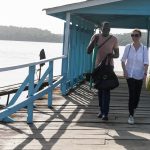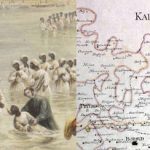
A Global History of Convicts and Penal Colonies: book launch
On July 4th 2018, the eminent scholar of empire, Professor Philippa Levine (University of Texas, Austin), launched my edited volume, A Global History of Convicts and Penal Colonies, at the annual conference of the Australian Historical Association, held at ANU, Canberra. This volume is one of the key outcomes of my ‘Carceral Archipelago’ project. […]

A Global History of Convicts and Penal Colonies
The main objective of the ‘Carceral Archipelago’ project has been to write the history of convicts and penal colonies into global history, by synthesizing existing research on some geographical contexts with new work on others. My edited volume, A Global History of Convicts and Penal Colonies, published in May 2018 , represents an important […]

A Day in the Life: Convicts on board Prison Hulks
By Anna McKay, AHRC Collaborative Doctoral Partnership Student, National Maritime Museum & University of Leicester. In 1775 the outbreak of the American Revolution halted the transportation of felons to the colonies. One year later, with gaols overflowing, the Criminal Law Act -also known as the ‘Hulks Act’- was passed. Convicts awaiting transportation were […]

Of Satellites and Sentiment: The Forgotten Vietnamese Prisoners of French Guiana
By Dr. Lorraine M. Paterson On April 18, 2008, Vietnamese journalist Danh Đức was standing in the rain at the Kourou Space Center, the European Space Agency’s spaceport in French Guiana, a territory that is, as an overseas département, still an integral part of France.[1] Eyes heavenward, Danh Đức was eager to witness the […]

The library in the penal colony: Chekhov’s unsung gift to Sakhalin
Chekhov’s contribution to the cultural landscape of the Sakhalin penal colony (1868-1905), the establishment of several school libraries containing more than 2,200 volumes for the island’s children and their convict parents, has received little attention compared with the acclaim accorded his prodigious 1890 demographic census of prisoners. “I visited every settlement and went into every hut,” he wrote.”I don’t […]

Upriver to Mazaruni Prison (Guyana)
One of the wonderful things about ‘blue skies’ research is the element of surprise that it can throw up. When I began work on ‘The Carceral Archipelago’ project, I had not planned to work on the British Caribbean. I had long been aware of early-modern British and Irish convict flows to islands like Barbados, […]

The double-minded revolutionary
In 1884, a Russian woman by the name of Liudmila Volkenshtein was found guilty of anti-tsarist “terrorism” by a military court in St Petersburg. Her crimes were bound up with her membership in an underground group called “The People’s Will” (Narodnaia Volia), an organization that in 1881 had carried out the assassination of Tsar Alexander II. Volkenshtein herself […]

Conference Report: Forced Labour, Confinement and Represssion: European, Imperial and Post-Colonial perspectives.
Two weeks ago, a joint workshop on ‘Forced labour, confinement and repression: European, Imperial and Post-Colonial Perspectives’ was hosted by The Carceral Archipelago project and The Stanley Burton Centre for Genocide and Holocaust Studies, both at the University of Leicester. Our aim was to bring into dialogue practices of coercion, confinement and forced labour […]

The “Pains of Imprisonment”: an historical sociology of penal transportation?
A few years ago, the eminent scholar of the Russian Gulag, Professor Judith Pallot, challenged me to consider the relevance of the sociology of incarceration as a means of understanding convict experiences in penal colonies. She advised me to think in particular about Gresham M. Sykes’ classic 1958 text, The Society of Captives: A […]

A Snapshot of Collaborative Work in History
During my PhD study and for the first ten years of my academic career, I researched alone. I went to the archives, I discussed and presented my work to academic audiences, and I published books and academic papers. Though like many others, I felt myself to be engaged in a larger intellectual project (subaltern studies, […]

Recent Comments